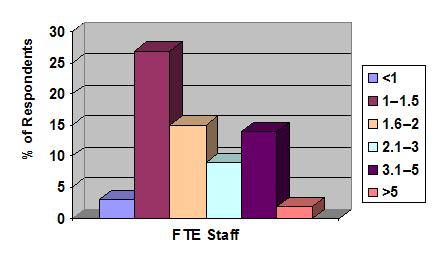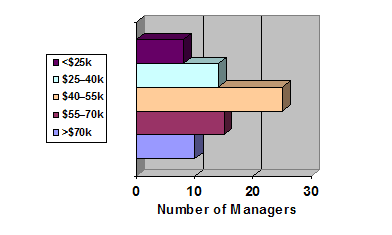
StaffingThe number, qualifications, and compensation of the staff that operate Appalachian incubators also were the subject of questions in the 2004 ARC survey. This section provides summary data from the surveys, as respondents were assured that no incubator-specific data would be disclosed. According to the 2004 ARC survey, the average Appalachian incubator has 2.4 full-time equivalent employees (FTEs). (Full-time equivalent is equal to either a full-time position, or multiple part-time ones that add up to the equivalent of one full-time position. For example, one half-time [0.5] and two quarter-time (0.25) positions would equal one full-time position [.50+.25+.25=1.00].) However, the range is dramatic—from a low of no staff to a high of 12 FTEs. Figure 16 shows the distribution across respondents. The greatest number of incubators have between 1 and 1.5 FTEs, although a substantial number have 1.6–2 FTEs or 3.1–5 FTEs. Roughly 60 percent of Appalachian incubators have between one and two FTEs. Figure 16. Distribution of FTE Staffing Among Incubators 
In addition to staff, the respondents to the 2004 ARC survey report having an average of 1.2 consultants or subcontractors involved in their programs. Again, the range is wide, with from zero to five consultants/subcontractors involved in these Appalachian incubators. The 2004 ARC survey also asked respondents about the educational attainment of incubator managers. This question was asked to help assess the qualifications of the managers and to generate answers comparable to earlier studies by the NBIA. Per the data in Table 9, Appalachian incubator managers appear to have almost equal educational attainment to incubator managers nationwide. About half of the Appalachian managers hold postgraduate degrees (master's, Ph.D, J.D., etc.). Respondents to the 2004 ARC survey were asked to indicate whether their incubator manager is a full-time employee. Roughly 75 percent of the respondents indicated that the manager of their incubator worked full-time, with 65 percent of managers working full-time in the incubator, and the other 10 percent working full-time with the parent organization of the incubator (meaning the managers have full-time positions, but spend only part of their time managing the incubator and spend the rest of their time on other responsibilities).
Respondents were asked about the salaries paid to their incubator managers. Figure 17 shows the distribution of manager salaries for Appalachian incubators. The greatest number of managers earn between $40,000 and $55,000 annually, although there are substantial numbers who earn $25,000–$40,000 and $55,000–$70,000. Figure 17. Distribution of Appalachian Incubator Managers' Salaries 
Table 10 compares the salaries of full-time managers of Appalachian incubators with those reported in NBIA's 2000 Manager Compensation study. Unfortunately, the categories used in the NBIA study are not directly comparable to those in the 2004 ARC survey, and there is a four-year difference between when the two surveys were conducted; so comparisons must be made with great caution. However, two conclusions can be drawn from this comparison. First, the number of full-time incubator managers making less than $40,000 per year is more than twice as high for Appalachian incubators as it is for the nation as a whole. Second, the percentage of full-time incubator managers making more than $70,000 per year is half as high for Appalachian incubators as it is for managers nationwide. (This actually understates this difference, as the NBIA category is >$75k and the NBIA survey is four years older.)
The following assessment can be made about the staffing of business incubators in Appalachia:
| ||||||||||||||||||||||||||||||||||||||||||||||||||||